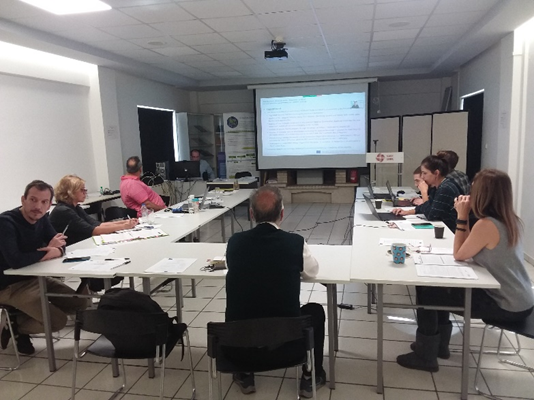EUROPEAN PROJECTS ➤ LIFE ➤BUILD UP SKILLS
BUS-REGRoUP project, implemented in the frame of the European Initiative BUILD UP Skills – "REbooting the GReek national platform and UPdating the national roadmap, was launched on November 1st, 2022 and its main objective is to update the Status Quo Analysis and the National Roadmap (NQR), already elaborated in the framework of the BUS-GR project (Pillar I of the BUILD UP Skills Initiative), almost ten years ago.
Given that the construction sector is in need of renewal, it can be observed that, in addition to the delay in adopting advanced technologies, the sector also presents basic management problems. For example, the preparation of the project implementation plan is poorly coordinated between the design office and the planning on site, and usually this coordination is done with tools such as paper. Contracts usually do not trigger innovations and performance measurement is sketchy with chain management methods remaining inadequate. New digital technologies have not yet been adopted, which could bring beneficial benefits in the medium term, while spending on research and development in construction is made at a much lower rate than in other sectors/sectors.

On the other hand, the EU "Renovation Wave", the inclusion of "Nearly Zero Energy Buildings" (NZEB) and the integration of resource efficiency issues, which are priorities of the EU on the path to full decarbonization by 2050 (but also in the context of the National Energy and Climate Plans – NECPs – of all Member States for 2030, which are now under review to take into account the needs of the "Fit for 55 package" and the REPowerEU project), require a workforce at all levels, with the suitable relevant skills to implement them.
Taking into account all the above, the BUS-REGRoUP project will update the Status Quo Analysis Report and the National Roadmap, which were prepared in the first phase of the BUILD UP Skills initiative (in the framework of the BUS-GR project), and focused on workers and craftsmen (blue-collar professionals). The texts will be updated for these professionals and enriched with new content mapping the skills needs of white-collar professions (e.g. architects, designers, engineers, product manufacturers, building managers, etc.), thus reflecting the reality and needs of the entire building value chain.
Thus, the updated Status Quo Analysis will gather all the necessary information on the current situation of the building/construction sector of the country regarding continuing education and training, energy efficiency and contribution to the 2030 goals, as well as existing barriers and gaps. Accordingly, the updated National Roadmap will explain how to overcome barriers and identified skills gaps in different occupations in a way to achieve the 2030 targets. In particular, it will provide a set of priority measures for the different professions, an action plan for the identified measures up to 2030, the critical factors and resources needed to drive up implementation, as well as measures to monitor the progress of the proposed activities.
A key role in the process of updating both the Status Quo Analysis and the National Roadmap will be played by the Greek National Qualifications Platform (NQP), which was created in the first phase of the BUILD UP Skills initiative (in the framework of the BUS-GR project). As the first NQP was established about ten years ago, one of the first actions of BUS-REGRoUP will be to revitalize it, as well as to broaden its scope with the participation of new stakeholders. Throughout the project, the NQP will have close cooperation and communication with BUS-REGRoUP project consortium, actively participating in regular consultation processes aiming at the final endorsement of the National Roadmap.
BUS-REGRoUP project is funded by the Clean Energy Transition of the LIFE Programme (LIFE-2021-CET) and has a duration of 18 months. The project is coordinated by CRES, while the 5-member partnership is complemented by educational institutions, research bodies, representatives of social partners and professional chambers, namely the National Technical University of Athens - Decision Support Systems Laboratory (EPU-NTUA), the Institute of Small Enterprises of GSEVEE (IME GSEVEE), the Labour Institute of GSEE (INE-GSEE) and the Technical Chamber of Greece (TCG).
OUTPUTS/RESULTS
Partners:

